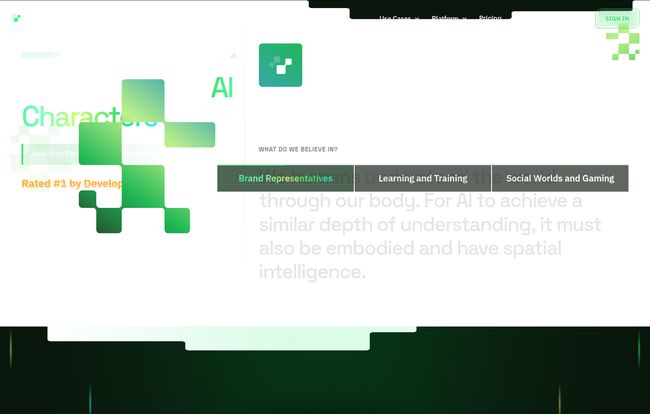We've all been there. You're deep into an epic RPG, the world is stunning, the story is gripping, and then you talk to a shopkeeper. He stares at you with those dead, glassy eyes and recites the same three lines of dialogue he's said for the last 40 hours. "Looking to protect yourself, or deal some damage?" It just shatters the illusion, doesn't it?
For years, creating truly dynamic, believable non-player characters has been the holy grail of game development. We've dreamed of worlds populated by characters who remember you, react to their surroundings, and can hold a conversation that doesn’t feel like you're navigating a phone menu. It's a problem that has stubbornly resisted even as graphics have become photorealistic.
Well, I've been playing around with a tool that might just be the breakthrough we've been waiting for. It's called Convai, and it’s not just another dialogue tree generator. It’s more like a brain and a voice box you can plug directly into your game characters. And I have to say, I'm pretty excited. And a little bit scared.
So, What Exactly is Convai?
In the simplest terms, Convai is a platform designed to power conversational AI for interactive characters. Think of it as a suite of tools that lets developers and creators give their NPCs the ability to see, hear, talk, and even act in real-time within a game or virtual world. This isn't just about pre-written text. We're talking about characters that can genuinely perceive a player's actions, understand spoken questions, and generate unique, relevant responses on the fly.
It’s built for a whole range of applications, from the sprawling open worlds of AAA games to smaller indie projects, and even the burgeoning metaverse and XR spaces. Whether you're a seasoned developer wrestling with C++ in Unreal Engine or a solo creator building in a no-code environment, Convai aims to make this high-level AI accessible.

Visit Convai
The Core Features That Actually Matter
Okay, the marketing spiel sounds great. But as an SEO and a tech enthusiast, I'm always skeptical. I've seen countless platforms promise the world and deliver a buggy, unusable mess. So I dug into Convai's actual feature set to see what's under the hood. And it's impressive.
Beyond Just Talk: Real-time Perception and Action
This is the big one for me. This is what separates Convai from a simple chatbot. Characters powered by Convai can be given 'perception'. They can 'see' objects or other characters in the game world and react to them. Imagine an NPC guard who doesn't just walk a set path, but notices you've left a door open and comments on it. Or a companion who can actually see you pointing at a mountain and say, "Wow, should we go check that out?" instead of just waiting for a dialogue prompt.
They can also perform complex actions based on the conversation. You could tell a character, "Please go pick up that sword and bring it to me," and they'll actually do it. This moves them from being passive information dispensers to active participants in the world. It’s like graduating from a puppet show to a full-on improv troupe.
A Universal Translator for Your Game World
Building a game for a global audience is a massive undertaking, especially when it comes to voice acting and localization. Convai tackles this head-on with built-in multilingual support. You can design your character's personality and knowledge base, and the AI can handle conversations in multiple languages. This could be a huge cost and time saver for developers looking to reach a wider market without recording thousands of lines of dialogue in every language.
Lip Sync and Animations That Don't Look Creepy
We've all seen bad lip-sync. The dreaded 'muppet mouth'. It's another immersion-breaker. Convai offers high-quality, real-time lip-sync that matches its generated audio, which is huge. But it goes a step further with what they call 'embodied animations.' The character won't just stand there stiff as a board while talking; they can be configured to gesture, express emotion, and move in ways that feel natural to the conversation. It's a subtle but critical piece of the puzzle in climbing out of the uncanny valley.
Building a Character's Brain
This is where the magic really happens for creators. Convai's system is built around a 'Multimodal Knowledge Bank.' You can feed your character information from pretty much anywhere—a character bio, game lore documents, even a Wikipedia page. This becomes the foundation of their personality and what they 'know.' You can then define their voice, conversational style, and narrative role. Are they a grumpy bartender who knows all the town gossip? A helpful AI guide? A villain who taunts the player with knowledge of their past failures? You build the brain, and Convai provides the voice.
Getting It Into Your Game: The Workflow
One of my biggest worries with platforms like this is integration. A cool tool is useless if it takes a team of engineers six months to get it working. Thankfully, Convai seems to understand this. They have dedicated, ready-to-go plugins for the big two: Unreal Engine and Unity. From what I've seen in their developer tutorials, it looks surprisingly straightforward to drag and drop a Convai character into a scene and get it running.
They also provide a web-based interface for designing the characters themselves, which means the narrative designers and writers don't need to be digging around in a game engine to craft their characters' personalities. This separation of creative and technical work is a smart move.
The Good, The Bad, and The Pricey
No tool is perfect. Let's get into a real, honest breakdown of where Convai shines and where it might stumble.
What I Love About It
Honestly, the ease of use is at the top of my list. The idea of no-code or low-code tools for something this complex is fantastic. It opens up a new world of creative possibilities for people who aren't hard-core programmers. The quality of the interactions, especially the perception and action capabilities, feels like a genuine step forward. I've always felt that the future of open-world games lies in systemic design, and this is a massive leap in that direction.
Where It Could Improve
Okay, let's talk about the elephant in the room. The pricing. While there's a free tier, it is quite limited. For any serious creator or indie dev, you're going to need to jump to a paid plan, and they aren't exactly cheap. We'll get to the specifics in a moment. Another point of concern is the reliance on cloud-based services. This means your characters need a constant internet connection to function. This could be a problem for latency, and it completely rules out offline play, which is a major bummer for many players. I'd love to see some kind of hybrid or on-device model in the future, but I understand the immense technical challenge there.
Let's Talk Money: Convai's Pricing Tiers
Alright, so what's this actually going to cost you? Convai uses a pretty standard tiered subscription model. It's great that they offer a way to get your feet wet for free, but production use will require an investment.
| Plan | Price | Best For |
|---|---|---|
| Free | $0 / month | Testing the platform and its basic functions. |
| Indie Dev | $22 / month | Solo creators and devs starting a new project. |
| Professional | $69 / month | Developers ramping up their project development. |
| Scale | $299 / month | Small teams building for production. |
| Business | $499+ / month | Large-scale production and enterprise needs. |
For the most current details, you should always check their official pricing page.
The jump from the 'Professional' to 'Scale' tier is significant, and that's likely the point where smaller indie studios might have to make some tough decisions. But for the power it offers, many might find the cost justifiable.
Is This The End of Scripted NPCs?
So, is this it? Is this the moment we throw out our scripts and let the AI take the wheel? I think... not entirely. And that's okay. Some might argue that a fully procedural, AI-driven character could break a carefully curated narrative. What if an NPC gives away a spoiler, or says something that contradicts the established plot? It's a valid concern.
In my opinion, the sweet spot for now isn't a complete replacement, but an enhancement. Use Convai for the ambient, systemic characters—the shopkeepers, the city guards, the random adventurers you meet on the road. Let them make the world feel alive. Meanwhile, you can keep your main, critical-path characters more tightly scripted to ensure the story hits its beats. It's about using the right tool for the right job, and Convai is a very, very powerful new tool in our toolbox.
Frequently Asked Questions about Convai
- Can Convai characters work offline?
- As it stands, Convai is a cloud-based service, so characters require an active internet connection to process conversations and actions. This means no offline play for Convai-powered features.
- How difficult is it to set up Convai in Unreal Engine or Unity?
- Convai provides dedicated plugins for both engines, which simplifies the process considerably. Based on their documentation and tutorials, someone with basic engine familiarity should be able to integrate a character without deep programming knowledge.
- Can I give my character a custom voice or personality?
- Absolutely. That's one of its core strengths. You define the character's knowledge, background, and personality through its knowledge bank, and you can select or customize its voice and speaking style.
- Is the 'Free' tier actually useful for a real project?
- The Free tier is perfect for evaluation, learning the system, and building small prototypes. However, its limitations on usage mean you'll need to upgrade to one of the paid plans for any game you intend to ship or scale up.
- Does Convai support languages other than English?
- Yes, multilingual support is a key feature, allowing you to deploy characters that can interact in various languages, which is a major advantage for reaching a global audience.
My Final Thoughts
After spending time looking into Convai, I'm genuinely optimistic. It's not a magic bullet that will instantly solve every problem in game design, but it is a powerful and surprisingly accessible platform that takes a giant leap in the right direction. It makes the dream of a truly interactive, living world feel closer than ever before.
The price and the online-only nature are real considerations, but for developers who want to be on the cutting edge of interactive entertainment, Convai is something you absolutely need to be looking at. It might just be the tool that allows you to create that game world you've always dreamed of—one where the shopkeeper might actually have something new, and interesting, to say.



